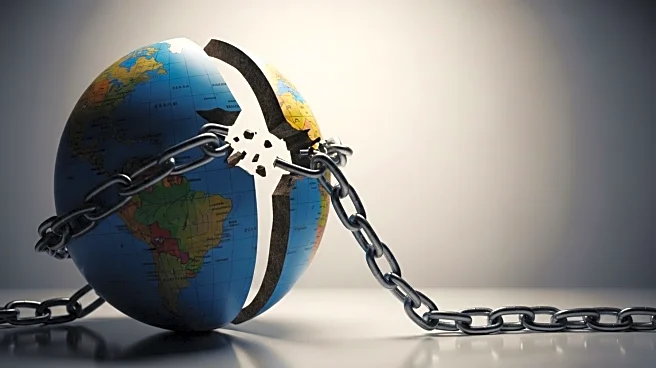What's Happening?
President Trump has excluded Australian Prime Minister Anthony Albanese from his official meeting schedule at the United Nations General Assembly in New York. The White House press secretary, Karoline Leavitt, announced that President Trump will hold bilateral meetings with Ukraine's President Volodymyr Zelenskyy and European Union leader Ursula von der Leyen, among others. Despite the exclusion, Albanese plans to speak with President Trump at a reception hosted by the U.S. President and First Lady Melania Trump. The Australian Prime Minister had previously been scheduled to meet Trump at the G7 summit in Canada, but the meeting was canceled due to Trump's early return to Washington. Albanese has expressed intentions to meet with Trump at the upcoming APEC summit in South Korea.
Why It's Important?
The exclusion of Prime Minister Albanese from President Trump's meeting schedule highlights ongoing diplomatic tensions between the U.S. and Australia. This development comes amid Australia's recent recognition of Palestinian statehood at the UN, a move criticized by the White House. The diplomatic snub could impact bilateral relations, especially in areas of strategic importance such as defense and trade. Australia's recognition of Palestine has also drawn criticism from Israel, further complicating international relations. The situation underscores the delicate balance countries must maintain in their foreign policy decisions, particularly when dealing with powerful allies like the United States.
What's Next?
Prime Minister Albanese is expected to seek informal discussions with President Trump during the UN reception. Additionally, a potential meeting at the APEC summit in South Korea could provide an opportunity for both leaders to address any diplomatic issues. The broader implications of Australia's recognition of Palestine may continue to influence its international relations, particularly with the U.S. and Israel. Stakeholders in both countries will likely monitor these developments closely, as they could affect future diplomatic and economic engagements.
Beyond the Headlines
Australia's recognition of Palestinian statehood reflects a significant shift in its foreign policy, which may have long-term implications for its role in Middle Eastern politics. This decision could influence other countries to reconsider their stance on Palestine, potentially altering the geopolitical landscape. The move also raises ethical questions about the international community's responsibility in addressing human rights and territorial disputes.










